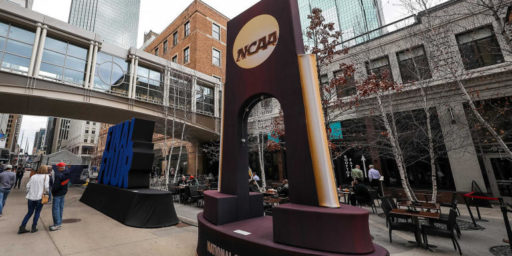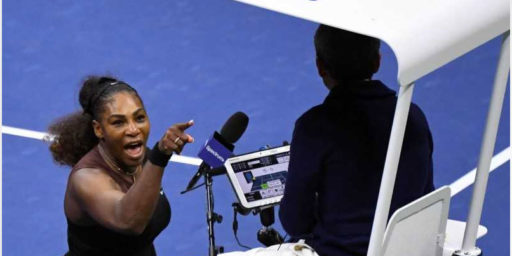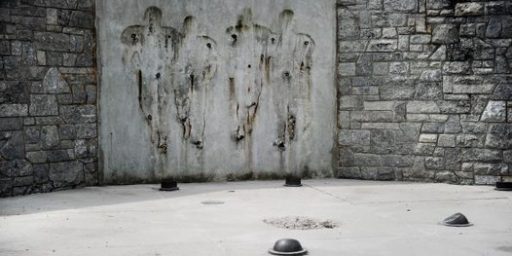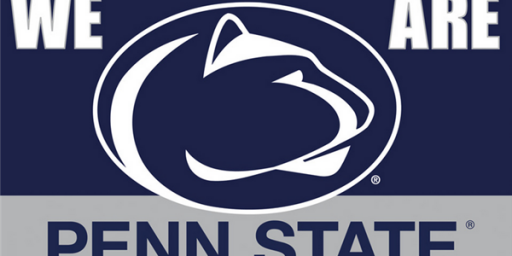NCAA Investigator: Alabama Couldn’t Control Booster
An NCAA investigator has admitted that the University of Alabama could not have avoided sanctions on its football team because the booster in question was outside the school’s control.
NCAA investigator: UA couldn’t stop sanctions (Birmingham News)
The investigator who probed illegal football recruiting in Memphis said the University of Alabama could not have avoided its sanctions even if UA had been warned before the Tide signed Albert Means.
In documents released last week in the Ronnie Cottrell-Ivy Williams lawsuit against the NCAA, Richard Johanningmeier said in a deposition there was nothing then-faculty athletics representative Gene Marsh could have done to avoid penalties because “I don’t believe anyone at Alabama could have controlled Logan Young.”
Young, the now-disassociated Alabama booster, was convicted in federal court in Memphis for bribery of a public official for paying Trevezant High football coach Lynn Lang $150,000 to steer Means to Alabama.
Former commissioner Roy Kramer said he regretted telling other Southeastern Conference schools about the Means investigation but not Alabama. Kramer had received several communications from University of Tennessee head football coach Phillip Fulmer regarding possible violations by Young in Memphis, according to the court documents.
Johanningmeier told attorneys for Cottrell and Williams that NCAA procedure did not call for investigators to inform schools that possible violations had occurred until an official letter of inquiry was sent by the investigators’ superiors.
Asked if Marsh could have prevented the violations had he been informed earlier, Johanningmeier said: “I don’t believe he could have because the violations had already occurred, and it was the (NCAA) staff’s position that, with the outside booster involvement, the university would have had a very difficult time and probably would have never been able to stop some of the activities that were going on.”
I’ve been arguing that for years. How a school is supposed to stop the actions of a wealthy but enthusiastic fan acting on his own accord is beyond me. That rather begs the question then, of why the school is held accountable for the actions of said boosters.
The NCAA’s sanctions process is an absolute travesty. The cases drag on for years and, when the inevitable penalties are handed down, the people who were in positions of responsibility when the infractions occured are usually long gone. Those punished are players who were in high school at the time of the alleged incident. It’s absolutely bizarre.






The NCAA as a sanctioning body has become little more than a travesty writ large. From the idiotic rules about players and recruiting to the insanely uneven penalties that have been handed down to the assinine BCS – the NCAA is proving far less than useful. The fact that the head of the agency is former Indiana U. pres. Miles Brand is more than a little ironic.
Take this to the next level. You can argue that by punishing the school the booster wants to succeed, you provide an incentive for the booster to stop what they were doing. At least to the degree that the disincentive (large in the value system of the booster, including any fellow fan shunning him as the man who killed their program) is balanced against the chances of being caught (which we don’t know since the number of cases like this that haven’t been found out is inherently unknowable).
But then go one level deeper. Say I am a wealthy booster of state U. I don’t want state U to be sanctioned, but I wouldn’t mind it if their main rivals at podunk U got sanctioned. So I spend some money through some cut outs, drop a dime and down comes podunk U’s program.
It’s like money in politics. Try to dam up one river of money and two more streams of cash will appear. The answer isn’t to ban, but to bring it into the open. Give up the fairy tale of student athletes and let them turn semi-pro. Let the universities have their team, just bring it above board. If a player also wants to get a college education, great. That can be a bonus perk they provide.
How about punishing the “boostee”, by making him/her ineligible for competitive sports–across the entire university sports universe–if someone (associated with a school or not) illegally promotes him/her? This, of course, would be in addition to punishing the illegal booster.
This would avoid collateral damage to innocents who happened to be at the same school.
If “provisional status” were required due to legal battles about a specific decision, then it would be up to the receiving university to decide whether they wanted to take a chance in having that title they won–due to the presence of suspect boostee-rescinded after the facts, if prooved.